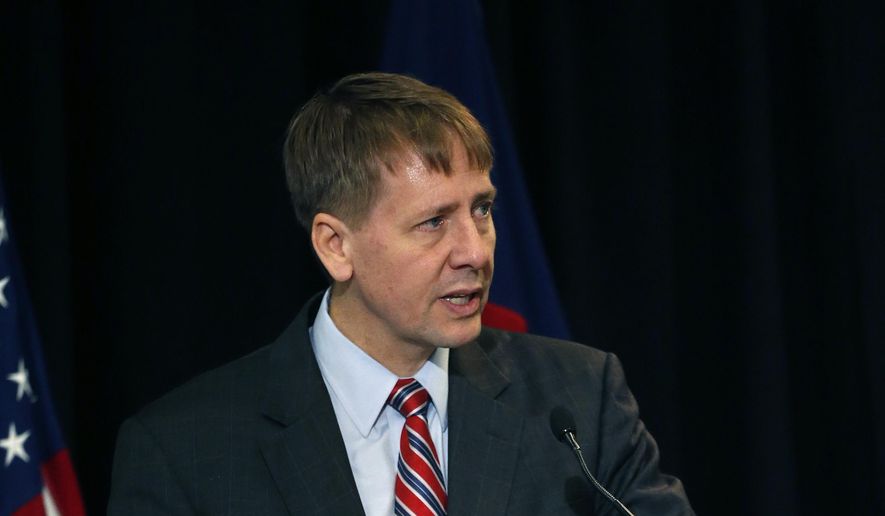The Consumer Financial Protection Bureau (CFPB) sounds benign —evocative of a robust defender of consumer interests. It’s the last institution you would suspect of shipwrecking your privacy.
“Aye, there’s the rub,” to borrow from Hamlet.
In denouncing warrantless wiretaps in Olmstead v. United States (1928), Justice Louis Brandeis elaborated: “Experience should teach us to be most on our guard to protect liberty when the Government’s purposes are beneficent. Men born to freedom are naturally alert to repel invasion of their liberty by evil-minded rulers. The greatest dangers to liberty lurk in insidious encroachment by men of zeal, well meaning but without understanding.”
That observation fits the CFPB’s consumer financial data collection octopus like a glove.
The agency is indiscriminately collecting millions of transactions under the soothing banner of research or analysis. According to the Government Accountability Office, the CFPB database including its sharing arrangement with the Office of the Comptroller of the Currency gives it access to almost 90 percent of outstanding credit card balances, 173 million mortgage loans, 11,000 consumer arbitration case records, and more. The database includes both account and transaction-level information.
This access invades far more than financial privacy. Justice William O. Douglas explained in dissenting in California Banking Association v. Schultz, “A checking account…may well record a citizen’s activities, opinions, and beliefs as fully as transcripts of his telephone records.” Checks may also reveal political associations, medical conditions or treatments, travels, girlfriends, or otherwise. Credit cards today perform the work of yesterday’s checks.
Justice Sonia Sotomayor further highlighted in her concurrence in United States v. Jones that, “Awareness that the Government may be watching chills associational and expressive freedoms. And the Government’s unrestrained power to assemble data that reveal private aspects of identity is susceptible to abuse.”
In NASA v. Nelson, the Supreme Court assumed but did not affirm the existence of a constitutional right to informational privacy.
It is time to affirm that assumption.
The right to be let alone from government snooping is a cornerstone of liberty and the pursuit of happiness. It encourages creativity and spontaneity. It promotes individual growth, learning, and maturation through a process of trial and error without risk of embarrassment.
Moreover, privacy emboldens citizens to censure and scrutinize government, the hallmark of a democratic dispensation.
Let’s face reality.
No person is absolutely clean on paper.
Citizens will refrain from criticizing government for fraud, waste, abuse or lawlessness if fearful of retaliation through the release of intimate or embarrassing information from a database. It hangs like a Sword of Damocles over the head of each citizen and creates a chilling effect on free speech even in the absence of documented instances of government abuse. Human nature is highly risk-averse.
Privacy, of course, is not absolute. The Fourth Amendment authorizes encroachments that are “reasonable,” with a heavy thumb against the government. The ordinary rule is that privacy must bow when a neutral magistrate finds probable cause to believe the place to be searched or the person to be seized is implicated in crime.
In contrast, the CFPB data collection is indiscriminate, divorced from suspected wrongdoing, and unfiltered through a neutral magistrate. Its purpose is unimpressive: to gain insights relevant to the functioning of markets for consumer financial products and services. That’s a trifle light as air in the Fourth Amendment balance insufficient to outweigh its strong presumption of privacy.
In United States v. Miller, the Supreme Court errantly gutted that presumption in denying checks any Fourth Amendment protection whatsoever. Justice Lewis Powell insisted:
“[C]hecks are not confidential communications but negotiable instruments to be used in commercial transactions. All of the documents obtained, including financial statements and deposit slips, contain only information voluntarily conveyed to the banks and exposed to their employees in the ordinary course of business….
The depositor takes the risk, in revealing his affairs to another, that the information will be conveyed by that person to the Government.”
How absurd!
Depositors reasonably expect the financial information shared with a bank via checks, credit or debit cards, or otherwise will stay with the bank. If a depositor wrote a check to Planned Parenthood or Americans for Tax Reform, he would reasonably expect that the payee would not be turned over by his bank to the government.
In the real world, there is no more voluntariness in sharing financial information with a bank than in handing over your wallet to a highwayman.
Miller should be overruled and the CFPB’s indiscriminate data collection held unconstitutional to end the current canyon between reality and the law.




Please read our comment policy before commenting.